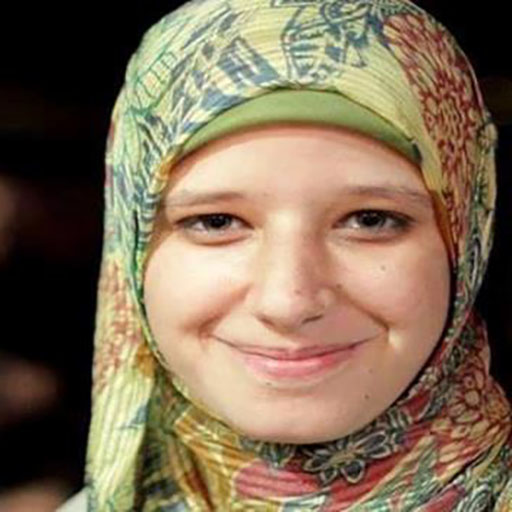Asmaa Mohamed El-Beltagy
Asmaa was the only girl among 4 brothers. She was known for her passion for reading in various fields and her ability to make friends of all ages. She was interested in the public affairs and politics. Her father was one of the prominent leaders of the Muslim Brotherhood(?), Dr. Mohamed El-Beltagy, but she had a different point of view than him and the group. She had an independent personality. Since day one, she was at the forefront of the Egyptian Revolution. Starting from January 25th, she was at the events of Mohamed Mahmoud Street although the Muslim Brotherhood refused to participate in this event. Asmaa also participated in the Rabaa al-Adawiya sit-in to oust president Mohamed Morsi, even though she was getting ready to start her final year at high school and striving to achieve higher grades to make her dream of joining the Faculty of Medicine come true. After she planned to work in global relief activities.
On Wednesday morning, August 14, 2013, Asma was at Rabaa Al-Adawiya sit-in, accompanied by her mother Sana Abdel Gawad, before the security forces started attacking Rabaa Al-Adawiya Square. Her mother offered that she should go home and then return if she wished, but Asmaa refused and preferred to stay. When the police and the army started attacking the protesters, to the surprise of her mother, Asmaa asked to make ablution in the middle of the chaos. There was no water around so Asmaa took out a small bottle of water from her bag and asked her mother to pour it slowly. Asmaa stood in the area peppered by bullets to pray and asked her mother to let her go to the field hospital inside the Rabaa al-Adawiya Mosque (which was a few minutes away). Her mother refused because the situation was getting worse and the snipers did not stop shooting—suddenly the police fired several tear gas cannisters and mother was able to see. She no longer found Asmaa beside her.
On her way to the mosque, Asmaa was shot and fell to the ground. Other protesters carried her to the medical center trying to save her and informed her mother of what happened.
One of the doctors at the field hospital named Dr. Ahmed Fahmy, said in his testimony that tried to assist Asmaa but could not. The bullet, which was fired from a helicopter, hit her in the chest and spleen injuring an artery or vein causing it to bleed. “We could have saved Asmaa’s life if we had access to an ambulance, but ambulances were not allowed to enter the area to save the injured and the security forces later fired tear gas at the field hospital,” he said.
In her last moments Asmaa needed blood, but the blood bank was destroyed. Eventually, they found one blood bag compatible with her blood, but she went into a coma and they had to perform a pulmonary heart resuscitation. She entered into another coma after and died within three hours of trying to save her life.
Her body was carried by her brother, Ammar al-Beltagy. He went to more than eight hospitals, but they all refused to receive her. Hospitals had security orders to not to provide any medical service for casualties of the Rabaa al-Adawiy Sit-in. Her brother then went to Al-Hussein Hospital and begged them to allow his sister the morgue. Two days later, they performed funeral prayers for Asmaa at the Masjid al-Salam Mosque in Nasr City amidst a large numbers of worshipers to bury her and to put her to rest. In Dr. El-Beltagy’s lamentation for his daughter he wrote, “I saw you in a dream wearing a wedding dress, beautiful and splendid. When you sat beside me I asked you, ‘When is your wedding today?’ You replied, ‘It will be in the afternoon, not in the night.’”
The Turkish President Recep Tayyip Erdoğan commemorated Asmaa by naming a park after her in Eastern Turkey.




